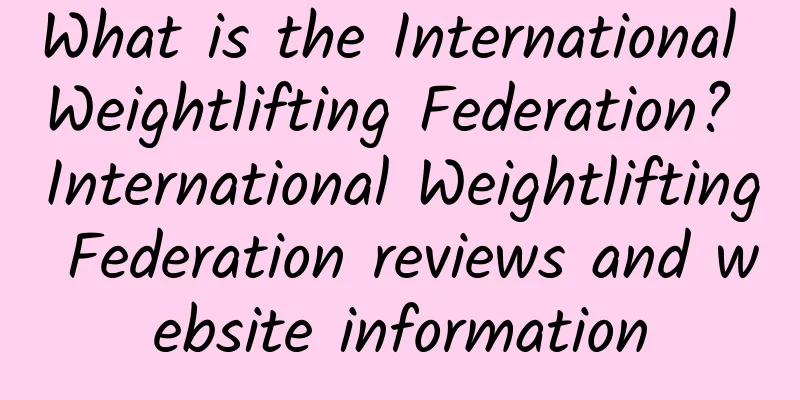What is the International Weightlifting Federation? International Weightlifting Federation reviews and website information

|
What is the website of the International Weightlifting Federation? The International Weightlifting Federation (IWF) is an international sports organization founded in 1905 and headquartered in Budapest, Hungary. It is the international weightlifting management organization and a member of the International Summer Olympic Sports Federation. Website: www.iwf.net The International Weightlifting Federation: The global guardian of weightliftingThe International Weightlifting Federation (IWF) is an international sports organization founded in 1905. As the global governing body of weightlifting, it plays a vital role in promoting the development of weightlifting, formulating rules and regulating competitions. Headquartered in Budapest, Hungary, the IWF not only undertakes the responsibility of coordinating weightlifting associations of various countries, but is also a member of the International Summer Olympic Sports Federation. Since its establishment, the International Weightlifting Federation has been committed to promoting the popularity and development of weightlifting around the world. Whether it is a top event such as the Olympic Games or a regional championship and qualification competition, the International Weightlifting Federation provides support and guarantee for these competitions with its authority and professionalism. Through its official website ( www.iwf.net ), the International Weightlifting Federation shows the charm of weightlifting to the world and provides rich information resources for athletes, coaches and weightlifting enthusiasts. This article will explore in depth the historical background, organizational structure, main responsibilities and impact of the International Weightlifting Federation on weightlifting from multiple perspectives to help readers fully understand this important international sports organization. History: From establishment to developmentThe history of the International Weightlifting Federation can be traced back to 1905. In that year, with the joint efforts of some European countries, this organization aimed at unifying the rules of weightlifting and promoting its internationalization was officially established. At that time, although weightlifting had existed for many years, it lacked a unified management organization to regulate competitions and rules. The establishment of the International Weightlifting Federation filled this gap and marked that weightlifting entered a new stage of development. In the early days of its establishment, the main task of the International Weightlifting Federation was to formulate unified competition rules and standards and coordinate cooperation between weightlifting associations of various countries. With the development of the times, weightlifting has gradually become one of the important events of the Olympic Games, and the International Weightlifting Federation has played a key role in it. Especially after the mid-20th century, weightlifting began to spread rapidly around the world, and the International Weightlifting Federation also expanded its influence. After entering the 21st century, the International Weightlifting Federation faces new challenges and opportunities. On the one hand, weightlifting needs to constantly adapt to the development trend of modern sports, such as introducing more advanced technical means to ensure the fairness of the competition; on the other hand, the International Weightlifting Federation also needs to deal with complex issues such as doping to maintain the reputation and healthy development of weightlifting. Over the past few decades, the International Weightlifting Federation has successfully enhanced the global influence of weightlifting through a series of reform measures. For example, by adjusting the competition level settings, strengthening anti-doping work and promoting youth weightlifting, the International Weightlifting Federation has injected new vitality into weightlifting. Organizational structure and operating mechanismAs a complex international sports organization, the internal structure and operation mechanism of the International Weightlifting Federation are worthy of attention. The organization consists of multiple levels, including the highest decision-making level, executive management level, and technical support level. This multi-level structural design ensures that the International Weightlifting Federation can perform its duties efficiently. At the highest decision-making level, the International Weightlifting Federation has a Congress and an Executive Committee. The Congress is composed of representatives from member countries around the world and is responsible for reviewing and approving major policy decisions. The Executive Committee is the core leadership team elected by the Congress and is responsible for decision-making and management of daily affairs. Through such an institutional arrangement, the International Weightlifting Federation can maintain democratic decision-making while ensuring efficient execution. In terms of executive management, the International Weightlifting Federation has set up several departments, each responsible for different functional areas. For example, the Competition Department is responsible for organizing and coordinating various international competitions; the Technical Department focuses on researching and formulating technical regulations for weightlifting; and the Anti-Doping Department is committed to combating the use of banned drugs and protecting the health of athletes and a fair competitive environment. In addition, the International Weightlifting Federation has also established a complete technical support system. This system includes referee training, data analysis, event broadcasting, etc. Through these technical supports, the International Weightlifting Federation has not only improved the quality and viewing experience of the events, but also laid a solid foundation for the long-term development of weightlifting. Main Responsibilities and ActivitiesAs the global governing body for weightlifting, the International Weightlifting Federation (IWF) has a number of important responsibilities, from event organization to rule-making to athlete protection, which together form the IWF's core mission. First of all, the International Weightlifting Federation is responsible for organizing and managing various international competitions, including Olympic weightlifting competitions, World Weightlifting Championships and other regional competitions. These competitions are not only a stage to showcase the charm of weightlifting, but also an important way to select and train outstanding athletes. Through careful planning and strict implementation, the International Weightlifting Federation ensures that every competition can meet the highest standards. Secondly, the International Weightlifting Federation is responsible for formulating and revising the rules of weightlifting. These rules cover many aspects such as competition procedures, scoring standards, and athlete qualifications. By regularly reviewing and updating the rules, the International Weightlifting Federation can adapt to the development and changes of weightlifting in a timely manner and ensure the fairness and safety of the competition. Thirdly, the International Weightlifting Federation attaches great importance to the protection of athletes' rights and interests. In this regard, anti-doping work is a key point. By establishing a strict testing mechanism and education program, the International Weightlifting Federation strives to create a clean and healthy competition environment. In addition, the International Weightlifting Federation also pays attention to the professional development of athletes and the protection of their retirement, and strives to provide them with all-round support. In addition to the above responsibilities, the International Weightlifting Federation is also actively involved in the promotion of weightlifting. By organizing training courses, seminars and cooperating with other sports organizations, the International Weightlifting Federation continues to expand the audience of weightlifting and enhance its social influence. Website Features and ServicesThe official website of the International Weightlifting Federation ( www.iwf.net ) is an important window for the federation to display its image and provide services. This website not only contains rich information resources, but also provides users with a variety of practical functions and services. First of all, the website details the history, organizational structure and responsibilities of the International Weightlifting Federation. This is a very valuable resource for users who want to learn more about the organization. In addition, the website also provides the latest news and event information, allowing users to keep abreast of the latest developments in weightlifting. For athletes and coaches, the technical information and competition rules on the website are very important reference tools. These materials can help them better prepare for competitions and training. At the same time, the website also provides an online registration system to facilitate users to participate in various international competitions. It is worth mentioning that the website of the International Weightlifting Federation also pays great attention to user experience. Through friendly interface design and convenient function settings, users can easily find the information and services they need. In addition, the website also supports multi-language browsing, allowing users from all over the world to access it without obstacles. Future Prospects and ChallengesAlthough the International Weightlifting Federation has made remarkable achievements in promoting the development of weightlifting, it still faces many challenges and opportunities in the future. First, with the advancement of science and technology, how to use new technologies to improve the fairness and viewing experience of the competition has become an important topic. For example, by introducing video playback technology and biometric technology, the results of the competition can be judged more accurately and the influence of human factors can be reduced. Secondly, the International Weightlifting Federation needs to continue to strengthen its anti-doping work. In recent years, the doping issue has attracted widespread attention in the sports world. The International Weightlifting Federation must take more stringent and transparent measures to ensure that all competitors compete in a fair environment. In addition, the International Weightlifting Federation needs to further expand the influence of weightlifting. This can be achieved by strengthening cooperation with the media, developing new marketing strategies, and increasing support for youth weightlifting. Only by allowing more people to understand and participate in weightlifting can this sport gain sustained development momentum. Facing these challenges and opportunities, the International Weightlifting Federation has formulated a clear strategic plan. Through continuous innovation and self-improvement, I believe that the International Weightlifting Federation will continue to lead weightlifting to a more brilliant future. ConclusionAs the global governing body of weightlifting, the International Weightlifting Federation has been committed to promoting the development and popularization of this sport since its establishment in 1905. Through a sound organizational structure, clear division of responsibilities and strong technical support, the International Weightlifting Federation has played an irreplaceable role in coordinating international competitions, formulating rules and standards, and protecting the rights and interests of athletes. Looking to the future, the International Weightlifting Federation is facing new challenges and opportunities. By actively responding to these challenges and continuously optimizing its own operating mechanisms and service levels, I believe that the International Weightlifting Federation will continue to make greater contributions to the prosperity and development of weightlifting. |
<<: How is Hanhua Eagle? Hanhua Eagle review and website information
>>: How is Pull&Bear? Pull&Bear review and website information
Recommend
Nutritional value and edible effects of seedless red grapes
Seedless red grapes are a type of red grape that ...
How to eat sugar apple
Sugar apple is not a very common fruit, but it is...
Garlic-fried eggplant ingredients and methods
I don’t know why I like eating eggplants so much ...
What is Daniel Craig like? Daniel Craig review and website information
What is Daniel Craig's website? Daniel Craig i...
Salt-baked chicken porridge recipe
I believe everyone has heard about the method of ...
What is the Caisse de dépôt et placement du Québec? Reviews and website information of the Caisse de dépôt et placement du Québec
What is the Caisse de dépôt et placement du Québec...
The difference between tealights and ordinary candles
Tea candles and ordinary candles are both candles...
The efficacy and function of sesame paste
Sesame paste is rich in calcium and iron, and tog...
How to make shacha sauce? How to make shacha sauce
Shacha sauce is a very common food in Fujian and ...
How to cook yellow millet Yellow millet cooking skills
Yellow millet is the most common porridge ingredi...
What is the Vallourec Group like? Vallourec Group reviews and website information
What is the website of Vallourec Group? Vallourec ...
What can't be eaten with purple rice?
Purple rice is called purple glutinous rice in li...
The benefits of eating water chestnuts
Water chestnut, also known as water chestnut, is ...
What is the 2016 Rio de Janeiro Olympics like? 2016 Rio de Janeiro Olympics reviews and website information
What is the website of the 2016 Rio de Janeiro Oly...
Starfish and carambola stewed with lean meat soup
Everyone knows that carambola is a delicious frui...









